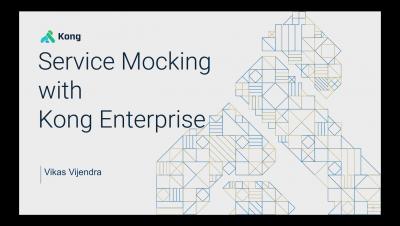Systems | Development | Analytics | API | Testing
Kong
Kuma 1.0.1 Released
We are happy to announce the release of Kuma 1.0.1 with a few improvements and fixes, and we suggest to upgrade to start using the greatest and latest. This is a minor update on top of Kuma 1.0 that shipped last week with over 70+ features and improvements. For a complete list of features and updates, take a look at the full changelog. Join us on our community channels to learn more about Kuma, including our official Slack chat.
Journey to the Cloud: From On-Prem to Public Cloud With Kong | Tyler Technologies
Service Mocking with Kong
Implement a Canary Release with Kong for Kubernetes and Consul
From the Kong API Gateway perspective, using Consul as its Service Discovery infrastructure is one of the most well-known and common integration use cases. With this powerful combination more flexible and advanced routing policies can be implemented to address Canary Releases, A/B testings, Blue-Green deployments, etc. totally abstracted from the Gateway standpoint without having to deal with lookup procedures.
Taking the Leap Seamlessly Transition Legacy Applications to Kubernetes
Service Design Guidelines with OpenAPI and Kong - Part I
We are in the midst of an explosion of APIs and microservices. For some, the first instinct of creating an API is to get down to building one. Some level of planning will help manage the quality of APIs when working within a team. In this series of blogs, we will be sharing some guidelines on service design while working on API projects with Kong. Let us start by focusing on how to go about designing APIs that end up as entities that the Kong API Gateway runtime understands.
Automating the Development Pipeline to Rapidly Design, Publish and Consume Services
Kuma 1.0 GA Released With 70+ New Features & Improvements
Today is a big day for Kuma! Kuma 1.0 is now generally available with over 70 features and improvements ready to use and deploy in production to create modern distributed service meshes for every application running on multiple clusters, clouds, including Kubernetes and VM-based workloads. Before we unpack this release, a big thank you to the community and to the users that have helped releasing this major version of Kuma with their contributions and feedback.
Kong Enterprise 2.2 Now Generally Available!
Today, we’re proud to announce the release of Kong Enterprise 2.2 GA! Kong Enterprise 2.2 is built on top of version 2.2 of our popular open source gateway and brings with it a slew of new features and some Enterprise-only features on top. Let’s dive in! For a long time, Kong has supported not only HTTP/HTTPS traffic with REST and gRPC APIs, but also raw TCP streams. In version 2.2, we now extend our support to include UDP-based protocols as well!









